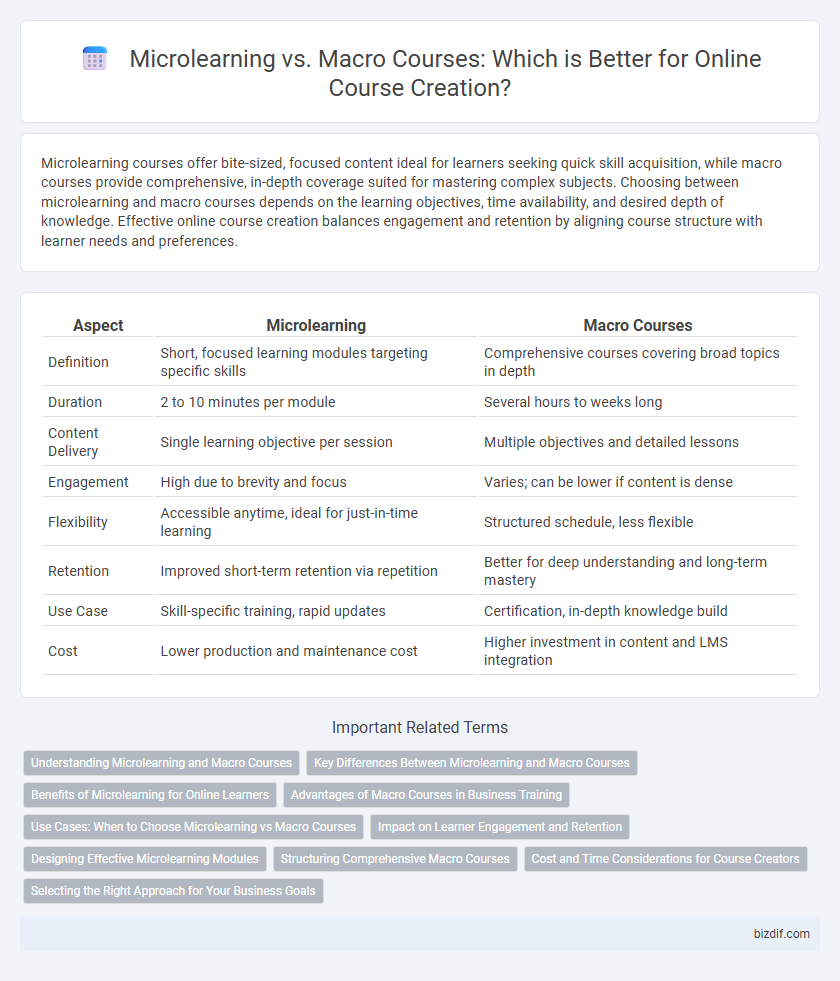Microlearning courses offer bite-sized, focused content ideal for learners seeking quick skill acquisition, while macro courses provide comprehensive, in-depth coverage suited for mastering complex subjects. Choosing between microlearning and macro courses depends on the learning objectives, time availability, and desired depth of knowledge. Effective online course creation balances engagement and retention by aligning course structure with learner needs and preferences.
Table of Comparison
| Aspect | Microlearning | Macro Courses |
|---|---|---|
| Definition | Short, focused learning modules targeting specific skills | Comprehensive courses covering broad topics in depth |
| Duration | 2 to 10 minutes per module | Several hours to weeks long |
| Content Delivery | Single learning objective per session | Multiple objectives and detailed lessons |
| Engagement | High due to brevity and focus | Varies; can be lower if content is dense |
| Flexibility | Accessible anytime, ideal for just-in-time learning | Structured schedule, less flexible |
| Retention | Improved short-term retention via repetition | Better for deep understanding and long-term mastery |
| Use Case | Skill-specific training, rapid updates | Certification, in-depth knowledge build |
| Cost | Lower production and maintenance cost | Higher investment in content and LMS integration |
Understanding Microlearning and Macro Courses
Microlearning courses deliver focused, bite-sized lessons designed for quick knowledge retention and flexible learning schedules, making them ideal for skill enhancement and just-in-time training. Macro courses provide comprehensive, in-depth content covering broad topics with structured modules, which support mastery and detailed understanding over extended periods. Choosing between microlearning and macro courses depends on learners' goals, time availability, and the complexity of subject matter.
Key Differences Between Microlearning and Macro Courses
Microlearning courses deliver concise, focused content in small, easily digestible segments, ideal for just-in-time training and enhancing retention through repetition. Macro courses provide comprehensive, in-depth coverage of broader topics, often spanning hours or weeks to support complete skill development or certification. Key differences include course length, content depth, learner engagement methods, and flexibility in pacing, with microlearning emphasizing brevity and accessibility, while macro courses emphasize thoroughness and mastery.
Benefits of Microlearning for Online Learners
Microlearning enhances retention by delivering content in short, focused segments that fit into learners' busy schedules, increasing engagement and minimizing cognitive overload. This approach supports just-in-time learning, allowing online learners to quickly acquire specific skills or knowledge relevant to immediate tasks. Mobile-friendly formats further boost accessibility, making microlearning ideal for continuous skill development in dynamic work environments.
Advantages of Macro Courses in Business Training
Macro courses in business training offer comprehensive, in-depth content that facilitates mastery of complex topics and promotes long-term skill development. These extensive courses enable structured learning paths, ensuring employees gain a cohesive understanding of business strategies and operational frameworks. Macro courses also provide scalability for corporate training programs, supporting consistent knowledge dissemination across diverse teams and departments.
Use Cases: When to Choose Microlearning vs Macro Courses
Microlearning is ideal for employee onboarding, compliance training, and skill reinforcement, offering concise, focused content for quick knowledge acquisition. Macro courses suit comprehensive subjects like software development, leadership training, or certification programs, providing in-depth and structured learning experiences. Choosing between microlearning and macro courses depends on factors such as training objectives, learner availability, and desired depth of content mastery.
Impact on Learner Engagement and Retention
Microlearning courses, characterized by short, focused segments, significantly enhance learner engagement by catering to limited attention spans and enabling easy content absorption. Macro courses provide comprehensive, in-depth knowledge, supporting long-term retention through structured, extended learning experiences. Combining microlearning's bite-sized modules with macro courses' detailed frameworks optimizes both immediate engagement and sustained knowledge retention in online education.
Designing Effective Microlearning Modules
Designing effective microlearning modules requires breaking down complex topics into focused, easily digestible segments that enhance learner retention and engagement. Unlike macro courses that provide comprehensive coverage over extended periods, microlearning delivers targeted, actionable content in short bursts, ideal for on-demand learning and skill reinforcement. Emphasizing interactivity, clear objectives, and concise multimedia elements enables microlearning to support flexible, personalized education in online course creation.
Structuring Comprehensive Macro Courses
Structuring comprehensive macro courses involves breaking down extensive content into well-organized modules that guide learners through detailed subject matter systematically. Incorporating clear learning objectives and varied assessment methods enhances knowledge retention and skill mastery across the broader curriculum. Detailed sequencing ensures learners build foundational concepts before advancing to complex topics, promoting effective long-term learning outcomes.
Cost and Time Considerations for Course Creators
Microlearning courses reduce development time and lower costs by focusing on concise, focused content that learners can complete quickly. Macro courses require more extensive resources, longer production timelines, and higher investment due to their comprehensive structure and in-depth material coverage. Course creators should balance budget constraints and time availability to choose the format that maximizes learning effectiveness within their production capacity.
Selecting the Right Approach for Your Business Goals
Choosing between microlearning and macro courses depends on your business goals and learner needs. Microlearning delivers concise, targeted content ideal for skill reinforcement and on-the-go training, boosting engagement and retention efficiently. Macro courses offer comprehensive coverage suited for in-depth mastery and complex subjects, supporting long-term educational objectives and detailed competency development.
Microlearning vs Macro courses Infographic

 bizdif.com
bizdif.com